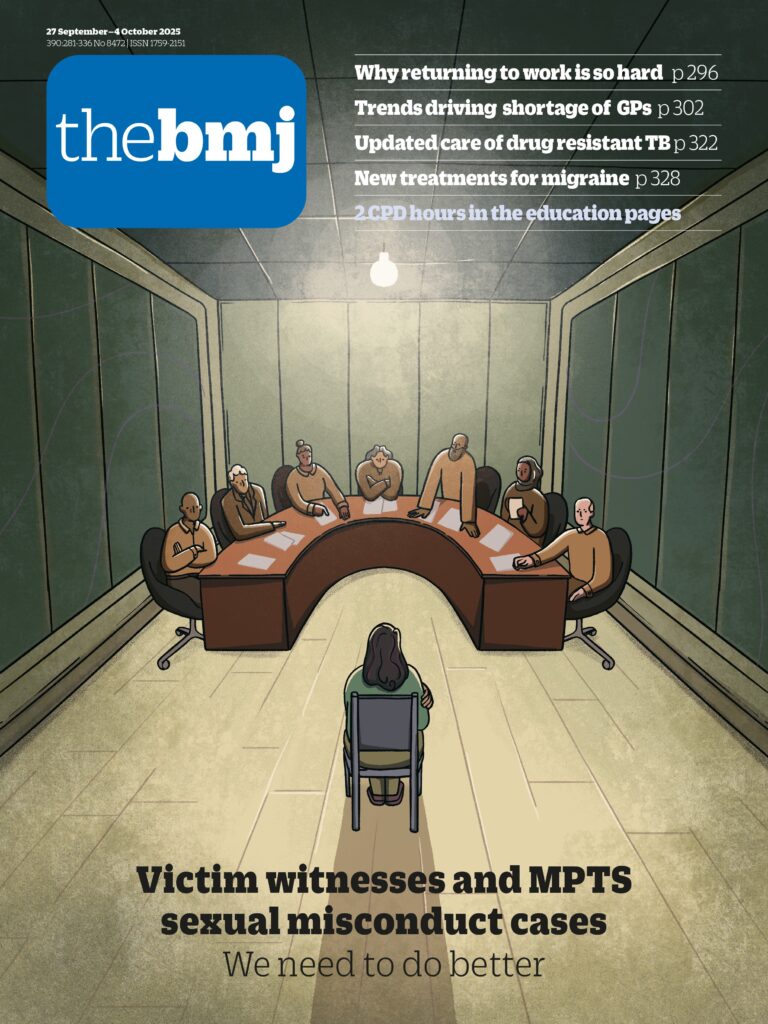Healthcare professionals can use their position to advocate for abolition, writes Bharat Malkani
As civil liberties are threatened around the world, there has been a concerning increase in use of the death penalty. Amnesty International and Human Rights Watch have raised concerns about the rising number of death sentences and executions in 2024 and 2025,12 the way in which executions are carried out, and the vulnerabilities of people facing execution. The healthcare community has an important role in opposing the death penalty. Doctors must refuse to participate in the execution process and speak out against a practice that is antithetical to their commitment to promote health and wellbeing.
Amnesty International reports that although the number of countries carrying out executions is decreasing, the number of executions in countries where it is legal has increased in recent years.1 At least 1518 executions took place globally in 2024, rising from 1153 recorded in 2023, making it the fourth consecutive year that the annual total has gone up.1 The 2024 total was the highest recorded by Amnesty International since 2015, when 1634 executions were recorded.1 Most of the recorded executions in 2024 took place in just three countries: Iran (at least 972); Saudi Arabia (at least 345), and Iraq (at least 63). Saudi Arabia has already executed at least 241 people in 2025 and could reach a record number for the year.2 Amnesty International notes that there are also believed to be thousands of executions in China each year, but official numbers are a state secret.
These numbers represent human lives. Some people are being sentenced to the ultimate punishment for relatively minor crimes and criticising states. Human Rights Watch has reported that in Saudi Arabia, Turki al-Jasser, a journalist who exposed corruption within the Saudi royal family, was executed in June.2 His execution, and that of other political prisoners globally, should be a cause of concern for anyone who cares about justice and freedom of speech.
There are also reports of people with mental illness and intellectual disability being subject to capital punishment. Consider the case of Lemi Limbu, currently awaiting execution in Tanzania for murdering her child.3 Regional and international human rights organisations have drawn attention to the domestic abuse that Limbu suffered over many years, and a clinical psychologist who assessed her concluded that she had the developmental age of a 10 year old. However, the medical evidence was not permitted at trial.
This is not an isolated case. International law prohibits the execution of people who are mentally ill or intellectually disabled, but clearly many judicial systems around the world lack adequate legislation or procedural safeguards to ensure that vulnerable people are identified and protected from the death penalty.4 Some countries don’t have enough qualified mental health professionals to ensure that prisoners receive proper mental health assessments.5
Another concerning aspect of capital punishment that needs more attention from medical communities is the use of medical professionals in execution processes. Medical professionalsmight assess a person’s mental competency before execution or monitor vital signs during the execution and certify death. China, the US, and Vietnam use lethal injections to put people to death, and concerns have been raised about the role of doctors in administering lethal injections.
In its code of medical ethics, the American Medical Association takes the position that doctors must not participate in a legally authorised execution.6 However, such guidelines have not prevented some doctors from taking part in executions. Even when they resist, prison and judicial authorities have found a way around. In Vietnam, if a physician refuses to take part in the execution process, they can be compelled by law to administer lethal injections.78 The World Medical Association has therefore issued a resolution calling for an end to physician involvement in executions.9
Given the worldwide trend towards authoritarianism and “tougher” approaches to law and order, it is unlikely that executions will stop anytime soon. It is also likely that capital punishment will continue to be inflicted on vulnerable people such as Limbu, and the brave, such as al-Jasser. Despite the lack of political will in countries such as Saudi Arabia or China to abolish capital punishment, it is incumbent on campaigning groups to keep highlighting the injustice and immorality of state sanctioned executions.
This responsibility extends beyond human rights groups. Two years ago, the Lancet called for doctors to condemn the death penalty,10 and Jay Chapman, a doctor who developed the use of lethal injection for executions, has spoken out against capital punishment.11 Healthcare professionals have powerful voices and are well respected. They can thus have a vital role in abolitionist efforts by refraining from being complicit in executions and by emphasising that the punishment is both inhumane from the point of view of medical ethics and a violation of the right to life.

